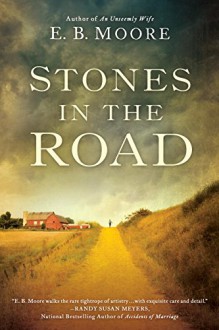 The last time Joshua’s father beats Joshua in the woodshed, they accidentally set the woodshed on fire. Joshua’s father is not just Amish, but a revered church deacon. Both father and son are badly burned. Eleven-year-old Joshua escapes, leaving behind his mom, his maimed dad and four sisters. For ten years, 1867 to 1877, Joshua is on the run. To survive, Joshua has to turn to the hated and feared “English.”
The last time Joshua’s father beats Joshua in the woodshed, they accidentally set the woodshed on fire. Joshua’s father is not just Amish, but a revered church deacon. Both father and son are badly burned. Eleven-year-old Joshua escapes, leaving behind his mom, his maimed dad and four sisters. For ten years, 1867 to 1877, Joshua is on the run. To survive, Joshua has to turn to the hated and feared “English.”
Stones in the Road alternates between Joshua’s point of view and his mother’s, Miriam’s. When Miriam is not tending to the farm, the “littles,” and her now disabled husband, Abraham, she searches for Joshua. Abraham tries to dissuade her. He claims Joshua died in the fire. Miriam is undeterred. She goes far afield in her search. She finds refuge not with her community of Amish, but with the enemy, the English, in the form of a kindly neighbor.
Both Joshua’s and Miriam’s narrow worlds crack open as they are abandoned by their own people and forced on journeys they never wanted to take. Not until Joshua is a grown man does he finally return home to New Eden and confront his father with the truth.
Before E.B. Moore was a novelist, she was a poet and a sculptor. The discipline of these twin arts shows in her prose: her sentences are plain, vivid, elemental--perfect for this tale of a plain people. And she has done her homework. I won’t soon forget her harrowing account of Joshua’s trip west as he joins a group of Conestoga wagons on the trail west.
The plots of both E. B. Moore’s novels, An Unseemly Wife and Stones in the Road, are drawn from family stories from two branches of Amish ancestors who left the fold. She grants rare insight into the ways, values and fears of the Amish.

 Log in with Facebook
Log in with Facebook 











